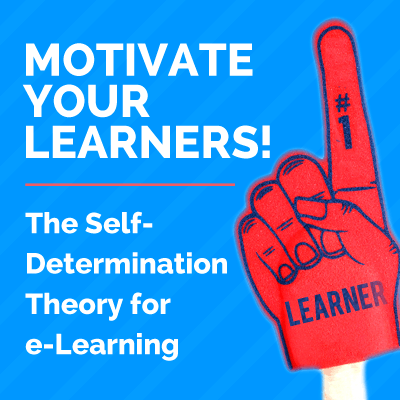A Practical Guide To Apply The Self-Determination Theory In Online Training
The Self-Determination Theory was introduced by psychologists Edward Deci and Richard Ryan, who suggested that human motivation is based on a variety of different emotional needs and internal/external influences. Essentially, the theory focuses on how much an individual’s actions, choices, and behavior are governed by self-motivation and determination. eLearning professionals can use this ideology not only to identify what motivates corporate learners, but also how they can tap into that motivation when creating online training courses. The ultimate goal is to encourage corporate learners to be self-determined, so that they have the focus and dedication it takes to achieve success on their own terms.
Self-Determination Needs
The Self-Determination theory suggests that corporate learners must have certain emotional needs met before they can experience personal growth. Deci and Ryan stated that there are 3 key emotional states that corporate learners must fulfill in order to become truly self-determined.
- Competence
Corporate learners must be able to feel confident in their own ability to complete a task or master specific skills. They should have a sense of competency and trust in the fact that they are able to control the outcome of the situation. In short, they must know exactly what will happen if they carry out a certain action or make a choice. Competence comes not only from the information and skills they learn, but also from their personal experiences. - Connection
Corporate learners must feel like they belong and are part of a larger online learning community. It’s all about being connected to our peers and knowing that we can interact with them in a meaningful way. This also involves caring for others and feeling that our opinions and thoughts are being respected. - Autonomy
Autonomy centers on the need for free will. Corporate learners must feel as though they are making decisions and performing actions that are in-line with their beliefs and opinions. This does not necessarily mean that they need to be independent and participate in self-study online training courses, but that they should feel that they are being true to themselves.
Motivation Types To Achieve Self-Determination
According to the Self-Determination Theory, the ultimate goal is to intrinsically motivate corporate learners so that they are able to achieve a state of "self-determination". As such, there are two types of motivation that Instructional Designers should consider:
- Extrinsic
Extrinsic motivation is derived from external influences. Deci and Ryan also introduced the Organismic Integration Theory, which is a sub-theory of the Self-Determination Theory. Organismic Integration Theory divides extrinsic motivation into four distinct categories that pertain to regulation:- Externally regulated behavior
This type of extrinsic motivation is governed entirely by external influences, demands, or the promise of a reward. For example, a corporate learner might complete an online scenario simply because they were instructed to do so. Externally regulated behavior is at the far end of the spectrum, while intrinsic motivation is at the other. - Introjected regulation of behavior
This form of extrinsic motivation centers on self-esteem and pride. In this instance, a corporate learner may feel that they need to prove something or display their competency. If they are unable to do so they might believe that others are disappointed by their actions or think less of them as a person. Introjected regulation of behavior is, by definition, intrinsically motivated. However, rather than performing an action because they want to, corporate learners feel as though they need to in order to please others or improve their societal standing. This makes it extrinsically motivated. - Regulation through identification
Regulation through identification occurs when a corporate learner makes a conscious effort to accept a behavior or choice and give value to it. For example, a corporate learner might claim that a specific belief is now important to them, even though they were indifferent about the idea on previous occasions. For one reason or another, they have chosen to make it part of their perception or belief system. This could be the result of peer pressure or simply the need to belong. - Integrated regulation
This form of extrinsic motivation is very similar to intrinsic motivation. In this case, corporate learners fully accept certain behaviors, ideas, or regulations and integrate them with their own belief systems. This is sometimes done on a completely unconscious level, unlike regulation through identification. As a result, the goals that corporate learners are trying to achieve may be intrinsic by nature, but their motives are extrinsic. In other words, they are doing the right thing for the "wrong" reasons.
- Externally regulated behavior
- Intrinsic
This is the pinnacle of Self-Determination Theory. Intrinsic motivation is governed entirely by internal factors, such as the drive to succeed or the thirst for new knowledge. Corporate learners who are intrinsically motivated actively participate in online training experiences because they want to achieve their goals and grow as individuals. They do not feel the need to please others, or to integrate an idea into their personal belief system simply because it is the "acceptable" thing to do. The only reward they need is knowing that they are going to get the necessary information and improve their comprehension of the subject matter. Stressing the real world benefits of your online training course and offering positive praise can fuel intrinsic motivation and get your corporate learners on the path to self-determination.
If you can take care of the corporate learner’s emotional needs and figure out what drives them, you have the power to develop amazing eLearning experiences that stick. This is why it’s essential to carry out extensive audience research to learn as much as possible about what motivates them to succeed and how you can meet their core needs.
Want to learn more about intrinsic motivation? Read the article Intrinsic Motivation In Online Training to discover 6 tips that can help you integrate intrinsic motivation into your online training program.









